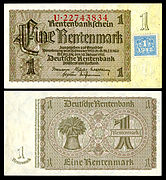Portal:Germany
Willkommen im Deutschland-Portal!

|

|

| |
Germany (German: Deutschland), officially the Federal Republic of Germany, is a country in Central and Western Europe, lying between the Baltic and North Seas to the north and the Alps to the south. It borders Denmark to the north, Poland and the Czech Republic to the east, Austria and Switzerland to the south, France to the southwest, and Luxembourg, Belgium and the Netherlands to the west.
Germany includes 16 constituent states, covers an area of 357,578 square kilometres (138,062 sq mi) and has a largely temperate seasonal climate. With 83 million inhabitants, it is the second most populous state of Europe after Russia, the most populous state lying entirely in Europe, as well as the most populous member state of the European Union. Germany is a very decentralized country. Its capital and largest metropolis is Berlin, while Frankfurt serves as its financial capital and has the country's busiest airport.
In 1871, Germany became a nation-state when most of the German states unified into the Prussian-dominated German Empire. After World War I and the Revolution of 1918–19, the empire was replaced by the parliamentary Weimar Republic. The Nazi seizure of power in 1933 led to World War II, and the Holocaust. After the end of World War II in Europe and a period of Allied occupation, two new German states were founded: West Germany, formed from the American, British, and French occupation zones, and East Germany, formed from the western part of the Soviet occupation zone, reduced by the newly established Oder-Neisse line. Following the Revolutions of 1989 that ended communist rule in Central and Eastern Europe, the country was reunified on 3 October 1990.
Today, Germany is a federal parliamentary republic led by a chancellor. It is a great power with a strong economy. The Federal Republic of Germany was a founding member of the European Economic Community in 1957 and the European Union in 1993. Read more...

Emanuel Lasker (German pronunciation: [eˈmaːnuɛl ˈlaskɐ] ; December 24, 1868 – January 11, 1941) was a German chess player, mathematician, and philosopher. He was the second World Chess Champion, holding the title for 27 years, from 1894 to 1921, the longest reign of any officially recognised World Chess Champion in history. In his prime, Lasker was one of the most dominant champions, and he is still generally regarded as one of the strongest players in history.
His contemporaries used to say that Lasker used a "psychological" approach to the game, and even that he sometimes deliberately played inferior moves to confuse opponents. Recent analysis, however, indicates that he was ahead of his time and used a more flexible approach than his contemporaries, which mystified many of them. Lasker knew contemporary analyses of openings well but disagreed with many of them. He published chess magazines and five chess books, but later players and commentators found it difficult to draw lessons from his methods.
Lasker made contributions to the development of other games. He was a first-class contract bridge player and wrote about bridge, Go, and his own invention, Lasca. His books about games presented a problem that is still considered notable in the mathematical analysis of card games. Lasker was a research mathematician who was known for his contributions to commutative algebra, which included proving the primary decomposition of the ideals of polynomial rings. His philosophical works and a drama that he co-wrote, however, received little attention. (Full article...)
- Parent portals
- Regional
- History
Holy Roman Empire (900–1806)
East Germany (1949–1990)
- Neighbouring countries

- 1853 – Birth of Albrecht Kossel, recipient of the 1910 Nobel Prize in Physiology or Medicine for research in cell biology
- ... that Goethe used his unrequited love to Maximiliane Brentano as inspiration for his novel The Sorrows of Young Werther?
- ... that Tilman Michael, who is set to be the Metropolitan Opera's chorus master from the 2024/25 season, helped the Oper Frankfurt win multiple awards for operatic choir of the year?
- ... that operatic tenor Walter Kirchhoff was also an officer in the cavalry division of the Imperial German Army?
- ... that a clip of a soft pretzel being cut perfectly in half made the short-lived German game show Schlag den Henssler briefly popular to an international audience?
- ... that Wolfgang Rihm said of the music of his 1987 opera Oedipus: "Sound is a weapon here – or a scalpel?"
- ... that German officials exiled the Samoan king from his own kingdom in 1887?
- ... that a scholar argued that the 2021 German novel About People, which is about the COVID-19 pandemic in the country, encourages "sympathy with rightwing extremists"?
- ... that Johann Joseph Dömling suggested in 1803 that venous blood contained carbon monoxide?

A Fischbrötchen (listen) (pl. "Fischbrötchen", lit. fish bread roll) is a sandwich made with fish and other components such as fresh white or dried onions, pickles, remoulade, creamy horseradish sauce, ketchup, or cocktail sauce. It is commonly eaten in Northern Germany, due to the region's proximity to the North Sea and Baltic Sea.
A common preparation is made with bismarck herring or soused herring. Other varieties use Brathering, rollmops, European sprat, salmon, smoked Atlantic mackerel, fried Atlantic cod, and other fish varieties (e.g., fish burgers). Prawns are sometimes used, as are various other species of food fish. Fischbrötchen are commonly served at fast food stands or take-out restaurants. (Full article...)
A list of articles needing cleanup associated with this project is available. See also the tool's wiki page and the index of WikiProjects.
Here are some tasks you can do. Please remove completed tasks from the list.
- Requests: German Archaeological Institute at Rome, Deutsche Familienversicherung, Dietlof von Arnim-Boitzenburg, Rolf von Bargen, Hennes Bender, Georg Bernhard (1875–1944), Eduard Georg von Bethusy-Huc, Rolf Brandt (1886–1953), Jan Philipp Burgard, Lisa Feller, Georg Arbogast von und zu Franckenstein, Georg Gafron, Ferdinand Heribert von Galen, Gundula Gause, Karl-Heinz Hagen, Herbert Helmrich, Nils von der Heyde, Monty Jacobs (1875–1945), Hans Katzer, Siegfried Kauder, Matze Knop, Wolfgang Kryszohn, Claus Larass, Isidor Levy (1852–1929), Markus Löning, Tobias Mann, Mathias Müller von Blumencron ,Günther Nonnenmacher Anke Plättner, Hans Heinrich X. Fürst von Pless, Gerd Poppe, Victor-Emanuel Preusker, Günter Prinz, Ulrich Reitz, Hans Sauer (inventor), Franz August Schenk von Stauffenberg, Paul Schlesinger (1878-1928),Oscar Schneider, Hajo Schumacher, Otto Theodor von Seydewitz, Christoph Sieber (comedian), Dorothea Siems, Werner Sonne, Anton Stark, Udo zu Stolberg-Wernigerode, Christoph Strässer, Joseph von Utzschneider, Jürgen Wieshoff, Hans Wilhelmi, Dietmar Wischmeyer, Alexandra Würzbach
- Unreferenced: Unreferenced BLPs, Bundesautobahn 93, Benjamin Trinks, Steeler (German band), Amelie Beese, Zoologisches Museum in Kiel, Emil Krebs, Prussian semaphore system, Partenstein, Peter Krieg, Porsche 597, Christa Bauch, Curt Cress, Stefan Beuse
- Cleanup: 53541 issues in total as of 2024-03-03
- Translate: Articles needing translation from German Wikipedia
- Stubs: Albersdorf, Thuringia, Ingo Friedrich, Berndt Seite, Federal Social Court; 120 articles in Category:German MEP stubs
- Update: Deutsches Wörterbuch
- Portal maintenance: Update News, Did you know, announcements and the todo list
- Orphans:
Orphaned articles in Germany
- Photo: Take/Add requested photographs
- Help assess the quality of 967 unassessed articles
The following Wikimedia Foundation sister projects provide more on this subject:
-
Commons
Free media repository -
Wikibooks
Free textbooks and manuals -
Wikidata
Free knowledge base -
Wikinews
Free-content news -
Wikiquote
Collection of quotations -
Wikisource
Free-content library -
Wikiversity
Free learning tools -
Wikivoyage
Free travel guide -
Wiktionary
Dictionary and thesaurus











































